July 27, 2024
Invasive pests impacting plants and trees
With its vivid coloring, the spotted lantern fly is so attractive that its looks could kill – which is the problem.
 "It's a terrible threat to all kinds of trees and plants, including grapes'' says Jo Ellen Meyers Sharp, the Hoosier Gardener. The spotted lantern fly isn't the only pest in Indiana – and other invasive pests are inching their way toward the state's borders. "It's a terrible threat to all kinds of trees and plants, including grapes'' says Jo Ellen Meyers Sharp, the Hoosier Gardener. The spotted lantern fly isn't the only pest in Indiana – and other invasive pests are inching their way toward the state's borders.
Jo Ellen, a well-known garden writer, speaker and garden coach, will join Nelson in-studio to tackle a range of invasive pests and share insights about how to handle them. Asian jumping worms will be on the, uh, menu for discussion. So will viburnum beetles, which threaten viburnums, a popular native shrub found in Indiana landscapes and forests.
The emerald ash borer, which has been a threat for several years to ash trees, is another invasive pest that we will explore. And the spongy moth, once known as the gypsy moth, is yet another invasive pest that Jo Ellen will discuss.
While we have Jo Ellen, the past president of GardenComm: Garden Communicators International, in the studio, Nelson plans to open the phone lines early so listeners can call in with any garden-related questions or comments. She has a four-season commercial and residential container planting business; for 20 years, Jo Ellen worked at a large, independent garden center in Indianapolis.
 According to a blog that Jo Ellen wrote about the spotted lantern fly, the insect originated in China. Despite their name, they are not flies; instead, they hop. They feed on 70 plant species, which "zaps the plants, weakening and stressing them, making them susceptible to disease and other insect problems, and possibly death." According to a blog that Jo Ellen wrote about the spotted lantern fly, the insect originated in China. Despite their name, they are not flies; instead, they hop. They feed on 70 plant species, which "zaps the plants, weakening and stressing them, making them susceptible to disease and other insect problems, and possibly death."
Asian jumping worms also are destructive. According to the University of Wisconsin Department of Natural Resources, they resemble a common earthworm or nightcrawler. The non-native jumping worms can be distinguished from an earthworm by their clitellum, a light-colored band that develops into an egg cocoon. On an earthworm or nightcrawler, the band is raised and further from the head; on an Asian jumping worm, the band is smoother and closer to the head.
The viburnum beetle is posing a potential threat to Indiana because it's been clearly established in Ohio, Illinois, Michigan and other nearby states. It threatens viburnum plants that are food for birds and other wildlife.
Although this focus on invasive pests will be a fresh topic for us with Jo Ellen, she has been our guest several times, including on a show in 2021 that explored Bradford pear trees and other invasive trees and plants. A 25-year veteran of print journalism, she is the owner of Write for You! LLC, a freelance writing and editing business. She publishes a free, monthly Hoosier Gardener Newsletter; you can subscribe here.
Latest Podcast Available!
 July 06, 2024 -D-Day and Hoosiers: 80 years later Click here for podcast.
July 06, 2024 -D-Day and Hoosiers: 80 years later Click here for podcast.
For a complete list of show podcasts and show enewsletters, please go to ARCHIVES on our website.
A Word from Molly and Nelson
Hoosier History Live to significantly reduce its media offering
"Yes, folks and fans, we know you love Hoosier History Live. But our resources have been dwindling for a long time. We just can't keep running on nothing!
In August, you will still be able to hear Nelson doing a live with call-in talk show Saturdays at noon on WICR 88.7 fm, or stream it on the WICR HD1 app. And we will continue to keep our website up so that our years worth of podcasts will be available for listening.
Sincerely, Molly and Nelson

More about our Hoosier History Live online collection
Remember that Hoosier History Live's most valuable asset is its online material. The Hoosier History Live ARCHIVES is essentially our collection of previously aired shows that have been turned into podcasts, as well as their accompanying newsletters. And yes, we do control our online product! And yes, we do want you to share our enewsletters, podcasts, and Facebook posts.
And here is another great show to listen to about the evolution of the funeral business in Indiana with guest Bruce Buchanan:

Click here for podcast
Funeral business evolution and civic involvement in Indy
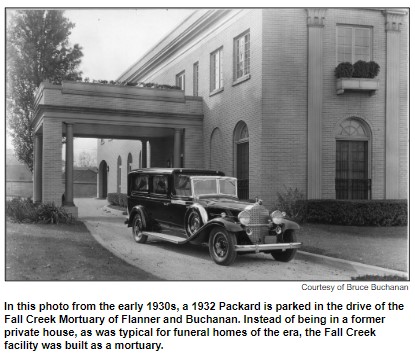
Ever since the 1820s, when David Buchanan arrived by covered wagon in the Indianapolis area and opened a tavern before becoming a farmer, the Flanner and Buchanan families have been intertwined with city history. Flanner and Buchanan Funeral Centers is a 142-year-old, family-owned business that began during an era when funerals and visitations typically were held in the parlors of private homes (hence, the derivation of the term funeral parlor). Before that, in the mid-1800s, undertakers often were carpenters.
As the funeral business evolved (Flanner and Buchanan opened the first crematorium in Indianapolis in 1904), so did the civic impact of members of the Flanner and Buchanan families, who were brought together by marriage in the 19th century. Frank Flanner, who began in the mortuary business in 1881, founded Flanner House (initially known as Flanner Guild House), a nonprofit to assist African Americans, including former enslaved people who had come to Indianapolis. His sister, Anna Flanner Buchanan, helped start the first YWCA in the city.
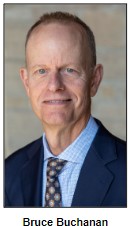 All of that and more will be explored during our show when Bruce Buchanan, the CEO of Buchanan Group Inc. (which includes Flanner and Buchanan Funeral Centers), the fourth generation owner, is Nelson's studio guest. The massive Community Life Center on the city's far eastside, a multi-purpose event space owned by Flanner and Buchanan, and adjacent Washington Park East Cemetery are on the site of David Buchanan's farmland in the 1830s. The multi-generational impact of the families on the funeral business and civic affairs is described in a lavishly illustrated book, Building Community: The Flanner and Buchanan Families of Indianapolis written by local author Julie Young. All of that and more will be explored during our show when Bruce Buchanan, the CEO of Buchanan Group Inc. (which includes Flanner and Buchanan Funeral Centers), the fourth generation owner, is Nelson's studio guest. The massive Community Life Center on the city's far eastside, a multi-purpose event space owned by Flanner and Buchanan, and adjacent Washington Park East Cemetery are on the site of David Buchanan's farmland in the 1830s. The multi-generational impact of the families on the funeral business and civic affairs is described in a lavishly illustrated book, Building Community: The Flanner and Buchanan Families of Indianapolis written by local author Julie Young.
The book describes the prominence of literary great Janet Flanner (1892-1978), Frank Flanner's daughter, who became famous beginning in the 1920s as a Paris-based writer. During our show with Bruce Buchanan, we will explore Janet's impact (she documented the early rise of Adolph Hitler) as well as family tragedies. They include the suicide in 1912 of mortician Frank Flanner, who drank a poisonous concoction, and the drowning deaths of two young Buchanan brothers in Fall Creek during the 1930s.
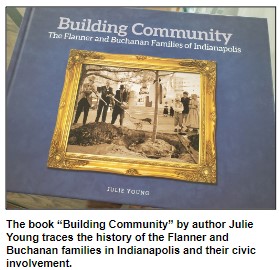 By then, Flanner and Buchanan had opened Fall Creek Mortuary, a structure that was built as a funeral center during an era when that was unusual; most were located in converted houses. Fall Creek Mortuary, which had a built-in organ and served as the flagship of the Flanner and Buchanan operation for decades, eventually was demolished in the 1990s.According to Building Community, the word "undertaker" was coined in the 19th century to describe someone, typically a carpenter, who was willing to "undertake the unpleasant duty" of handling the final presentations of the deceased. By 1887, when Frank Flanner persuaded his brother-in-law Charles Buchanan, Anna's husband, to join him in the business, the term undertaker was being dropped in favor of the more professional term of "funeral director". Like the Flanners, Charles Buchanan became immersed in civic affairs, including crusading for the creation of the Indiana Dunes State Park. By then, Flanner and Buchanan had opened Fall Creek Mortuary, a structure that was built as a funeral center during an era when that was unusual; most were located in converted houses. Fall Creek Mortuary, which had a built-in organ and served as the flagship of the Flanner and Buchanan operation for decades, eventually was demolished in the 1990s.According to Building Community, the word "undertaker" was coined in the 19th century to describe someone, typically a carpenter, who was willing to "undertake the unpleasant duty" of handling the final presentations of the deceased. By 1887, when Frank Flanner persuaded his brother-in-law Charles Buchanan, Anna's husband, to join him in the business, the term undertaker was being dropped in favor of the more professional term of "funeral director". Like the Flanners, Charles Buchanan became immersed in civic affairs, including crusading for the creation of the Indiana Dunes State Park.
Frank Flanner convinced other civic leaders to help launch Flanner House, a nonprofit that continues to this day. Its dedication ceremony in the early 1900s was attended by Booker T. Washington, who stayed at Frank Flanner's house when he was turned down by local hotels. Frank Flanner's other civic involvement included helping launch what became the Herron School of Art and Design.
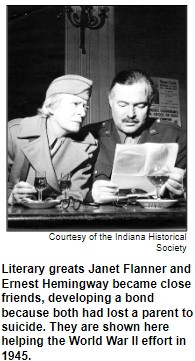 Janet Flanner, Frank Flanner's daughter, became one of the first movie critics in the country, writing about silent films for the Indianapolis Star. Beginning in the 1920s, though, she was a correspondent for The New Yorker magazine based in Paris. That's where she befriended other American expatriates including legendary novelists Ernest Hemingway and F. Scott Fitzgerald. Janet Flanner, Frank Flanner's daughter, became one of the first movie critics in the country, writing about silent films for the Indianapolis Star. Beginning in the 1920s, though, she was a correspondent for The New Yorker magazine based in Paris. That's where she befriended other American expatriates including legendary novelists Ernest Hemingway and F. Scott Fitzgerald.
Other members of the extended Flanner and Buchanan families also carved out careers beyond the funeral business. Paul Buchanan Jr., the father of our guest Bruce Buchanan, was a well-known judge and an art collector until his death in 2008. His vast collection of Brown County artwork now is displayed at Flanner and Buchanan funeral centers.
The family's heritage is Scottish. David Buchanan, the pioneer who came to the new city of Indianapolis in the 1820s, had been born in Virginia. The farm that he started in far-eastern Marion County was on the National Road (now U.S. 40, or Washington Street, as it's known in the city). The Community Life Center that opened in 2001 on the farm's site is a building of 20,000 square feet that has become a venue for weddings, receptions and community events as well as celebrations of life and funeral visitations.
Trivia prizes sought
Our "History Mystery" on air contest continues to be very popular! If you are an organization or business that would like to contribute tickets or admissions, please contact our host Nelson at nelson@hoosierhistorylive.org.
Prizes must fit in a standard business envelope. Hoosier History Live prefers to "snail mail" prizes to our trivia winners. And If prizes are time sensitive, they need to be offered well in advance of the event so that we can get them out in time.
Who can you see in this “Hoosier History Live Photo Album” . . .
Swipe through these photos gleaned from the last fourteen years of Hoosier History Live production!
And would you believe that radio technology has completely changed tech wise since we first went on the air in 2008 at WICR? Can you find Bobby Plump, Chris Gahl, Connie Zeigler, Tom Ridley, Bonnie Britton, Tiffany Benedict Browne, Eunice Trotter, David Baker, Lefty Huntzinger, Keira Amstutz, Cowboy Bob, Janie of “Popeye and Janie”, K.P. Singh, Pam Fraizer, and Dark Rain Thom? The voices of so many Hoosiers blended together over the years to make Hoosier History Live such a unique archive.
And thanks to Richard Sullivan of Monomedia for creating this group of images.
What people are saying about Hoosier History Live
"...Are fulfilling a valuable role..."
"Hoosier History Live is a haven of trustworthy knowledge. Molly Head and Nelson Price are fulfilling a valuable role in making quality scholarship about our state readily available to on-the-go listeners, expanding how we engage with the history and culture of Indiana."
-Wayne Hastings, Bloomington listener and library science student
"...A great service with the creation of independent media..."
"Both Nelson Price and Molly Head do the public a great service with the creation of independent media project Hoosier History Live. The program adds considerably to the public IQ, at a time when intelligence is much needed."
- Tom Cochrun, former news anchor, WTHR-TV Channel 13 Indianapolis
"... an intelligent, well-researched program..."
"I’ve loved listening to Hoosier History Live during the pandemic as an intelligent, well-researched program to escape the news for an hour."
-Lee Little, JD, MLS, Research Librarian, Indiana University
"...'Live' - and 'Lively' as well..."
"Hoosier History really is 'Live' - and 'Lively' as well. The program brings to new audiences the delight and wisdom that comes with knowing more of our past and our connections as Hoosiers."
- James H. Madison, Emeritus History Professor, Indiana University
"...interactive, more entertaining and more 'relevant'..."
"As museums and educational institutions scramble to make their offerings more interactive, more entertaining and more 'relevant', Hoosier History Live seems to have mastered that formula."
- Glynis Worley, rural Bartholomew County listener
"...a great way to learn more about history..."
"The links on the Friday Hoosier History Live enewsletter are a great way to learn more about history, and from a variety of sources."
- Jill Ditmire, Omni Media Specialist
"I love the podcasts..."
"I love the podcasts! I work on Saturdays and cannot always hear the live broadcasts. Sometimes I also like to listen a second time."
- Terri Gorney, Fort Wayne listener
"...infuses joy into the pursuit of history..."
"Nelson Price, more than anyone I know, infuses joy into the pursuit of history. And that joy rings out loud and clear on the radio show, Hoosier History Live."
- Marsh Davis, President, Indiana Landmarks
"... a compelling and engaging project..."
"Molly Head and Nelson Price are Indiana-based visionaries who have created a compelling and engaging media project with Hoosier History Live. Podcasts, website, enewsletter, and live call-in radio show; it’s all there!"
- Keira Amstutz, President and CEO, Indiana Humanities
"...does more to promote Indiana history..."
"Hoosier History Live does more to promote Indiana history than does any single source."
- Andrea Neal, Indianapolis author and educator
"...always a great show"
“Hoosier History Live is always a great show. We did a small sponsorship as a gesture of support, and I didn’t think a little history show would have much impact. But many people mentioned to me that they had heard our credit on the radio.”
- G.B. Landrigan, Realtor, Certified Residential Specialist
"...a great way to represent what I do..."
"I have thoroughly enjoyed my experiences with Nelson Price and the Hoosier History Live team. I feel being on the show was a great way to represent what I do with motorsports history. I am particularly excited by the show's new distribution through a podcast and making it accessible live through the Web.”
-Mark Dill, owner, FirstSuperSpeedway.com
"...great value to sponsors..."
"Hoosier History Live has amassed a vast library of content over the years, both with the show audio and newsletter material. I believe that the Hoosier History Live content has great value to sponsors and advertisers via widespread online distribution. Nowhere else do you find the fresh new material each week, the depth of stories, the richness of detail, and the long-term consistency."
- John McDonald, CEO, ClearObject in Fishers, Indiana, Inc. Magazine’s fastest-growing IT company in Indiana for 2014, 2015, 2016 and 2017.
"...enthusiastic, curious and knowledgeable..."
"Hoosier History Live is a perfect place to consider and reconsider history ... not just what happened in the past, but what it may mean in the present. Nelson Price is the perfect host: enthusiastic, curious and knowledgeable. Tune in to Hoosier History Live and be prepared to be surprised."
- James Still, playwright in residence, Indiana Repertory Theatre
"...I want to call in!..
"No, I haven't heard of another call-in talk radio show about history. Our airwaves are now full of the worst vitriol! Give me the phone number for the show. I want to call in!"
- Ken Burns, speaking at a preview of his film "The War" at Indianapolis Hebrew Congregation, April 18, 2007
"Another Hoosier History Live endorsement from a Hoosier in California ..."
"Hoosier History Live is a bright spot in my media constellation. I also frequently forward your weekly enewsletters to friends around the globe. I may now be a Californian, but my Hoosier interest is endless. The podcasts and streaming are good tools. By all means, persevere!"
- Tom Cochrun, former news anchor, WTHR-TV Channel 13 Indianapolis
"From a Hoosier who knows her books..."
"Fills a niche for the lover of Indiana history."
- Kathleen Madinger Angelone, retired bookstore owner
Podcast listening, and Hoosier History Live copyright policies
We still do a live radio show every Saturday from noon to one broadcasting on WICR 88.7, but more and more of our listeners are listening to our podcasts, which are basically audio copies of our live shows. Our website is www.hoosierhistorylive.org, and you can sign up at our website to get our free weekly newsletter.
At the top of our newsletter and website we put notice, and links, to our newly published podcasts. We also provide a link to ARCHIVES, which is a list of our past enewsletters and published podcasts.
 If you have a preferred podcast provider like Apple Podcasts or Spotify, you can use their search function to call up Hoosier History Live as well. Look for the yellow Hoosier History Live logo. If you have a preferred podcast provider like Apple Podcasts or Spotify, you can use their search function to call up Hoosier History Live as well. Look for the yellow Hoosier History Live logo.
We copyright our work, and we have a crew of very talented people putting it together. But we WANT you to share it! We believe that learning should be accessible to everyone! You are welcome to copy, link to, or forward any of our Hoosier History Live material. Just please do not edit it! Our underwriter logos and voiced credits are on our material; and these underwriters make our work possible.
| 


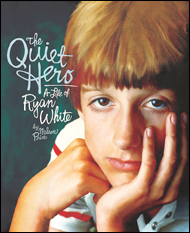
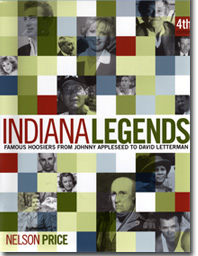
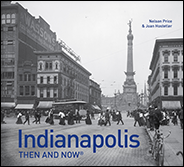
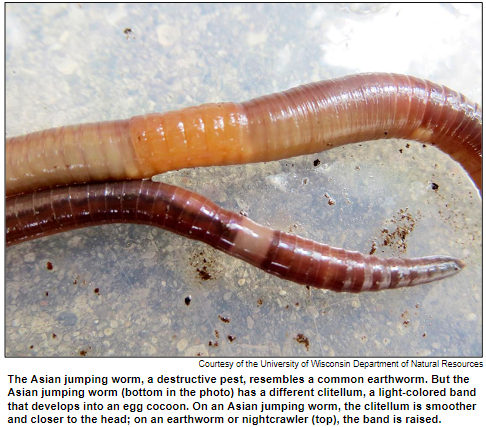
 "It's a terrible threat to all kinds of trees and plants, including grapes'' says
"It's a terrible threat to all kinds of trees and plants, including grapes'' says  According to a blog that Jo Ellen wrote about the spotted lantern fly, the insect originated in China. Despite their name, they are not flies; instead, they hop. They feed on 70 plant species, which "zaps the plants, weakening and stressing them, making them susceptible to disease and other insect problems, and possibly death."
According to a blog that Jo Ellen wrote about the spotted lantern fly, the insect originated in China. Despite their name, they are not flies; instead, they hop. They feed on 70 plant species, which "zaps the plants, weakening and stressing them, making them susceptible to disease and other insect problems, and possibly death."



 All of that and more will be explored during our show when
All of that and more will be explored during our show when  By then, Flanner and Buchanan had opened Fall Creek Mortuary, a structure that was built as a funeral center during an era when that was unusual; most were located in converted houses. Fall Creek Mortuary, which had a built-in organ and served as the flagship of the Flanner and Buchanan operation for decades, eventually was demolished in the 1990s.According to Building Community, the word "undertaker" was coined in the 19th century to describe someone, typically a carpenter, who was willing to "undertake the unpleasant duty" of handling the final presentations of the deceased. By 1887, when Frank Flanner persuaded his brother-in-law Charles Buchanan, Anna's husband, to join him in the business, the term undertaker was being dropped in favor of the more professional term of "funeral director". Like the Flanners, Charles Buchanan became immersed in civic affairs, including crusading for the creation of the
By then, Flanner and Buchanan had opened Fall Creek Mortuary, a structure that was built as a funeral center during an era when that was unusual; most were located in converted houses. Fall Creek Mortuary, which had a built-in organ and served as the flagship of the Flanner and Buchanan operation for decades, eventually was demolished in the 1990s.According to Building Community, the word "undertaker" was coined in the 19th century to describe someone, typically a carpenter, who was willing to "undertake the unpleasant duty" of handling the final presentations of the deceased. By 1887, when Frank Flanner persuaded his brother-in-law Charles Buchanan, Anna's husband, to join him in the business, the term undertaker was being dropped in favor of the more professional term of "funeral director". Like the Flanners, Charles Buchanan became immersed in civic affairs, including crusading for the creation of the  Janet Flanner, Frank Flanner's daughter, became one of the first movie critics in the country, writing about silent films for the Indianapolis Star. Beginning in the 1920s, though, she was a correspondent for The New Yorker magazine based in Paris. That's where she befriended other American expatriates including legendary novelists Ernest Hemingway and F. Scott Fitzgerald.
Janet Flanner, Frank Flanner's daughter, became one of the first movie critics in the country, writing about silent films for the Indianapolis Star. Beginning in the 1920s, though, she was a correspondent for The New Yorker magazine based in Paris. That's where she befriended other American expatriates including legendary novelists Ernest Hemingway and F. Scott Fitzgerald.
 If you have a preferred podcast provider like
If you have a preferred podcast provider like